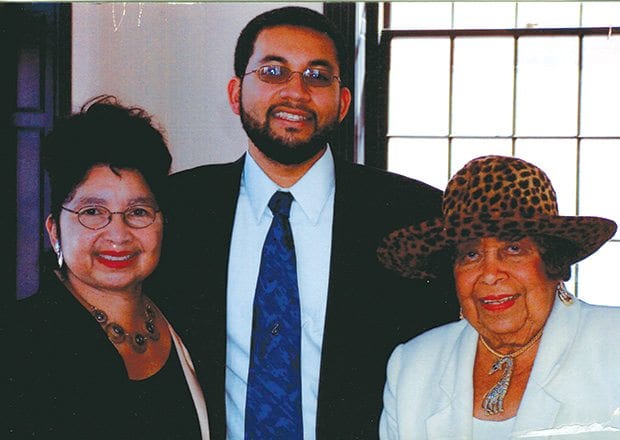Georgine Hill, 95, civil rights activist, arts supporter
Black History

During Black History Month, the black press traditionally publishes stories about the achievements of African American individuals. Rarely is there the occasion to report on the achievements of multi-generational successes in one family.
With her death in Bermuda on Jan. 27, just a few days short of her 96th birthday, Georgine Russell Hill has joined the annals of black history. Roxbury has lost its most outstanding dowager and her family has lost its loving matriarch.
Many of Hill’s friends referred to her as “the Duchess” because of her extraordinary personal dignity and her commitment to propriety. She seemed to be always aware that she had the responsibility to sustain the reputations of two historically significant families — one in Boston and the other in Bermuda.
She was born in Boston and attended public schools and Girls’ Latin. She then went to the Massachusetts College of Arts where she studied painting. She lived with her parents and two sisters on Hazelwood Street in Roxbury. Her father, Dr. Alfred Russell, was a Harvard-educated dentist.
The family’s status was already established when the Duchess’ great grandfather, John Jay Smith, came to Boston in 1848 and became active in the abolitionist movement. After the Civil War he was elected to the Massachusetts House of Representatives in 1868, 1869 and 1872. He was later appointed to a seat on the Boston Common Council.
One of Smith’s daughters married George Franklin Grant, a dentist who established great prominence for the family. The Duchess’ grandfather not only invented the golf tee, but his dental expertise was so great that he was appointed to the Harvard Dental faculty in 1871. Dr. Grant was the first black to become a Harvard professor.
While in college, the Duchess met Hilton Gray Hill, a student at Boston University. They married and moved to Bermuda in 1941. Nonetheless, the Duchess remained assertively a Bostonian over the years. She sent her son and daughter to the family home in Roxbury so that they could attend the Latin schools.
The young bride found Bermuda to be much more racially discriminatory than what she had become accustomed to in Roxbury. She resolved early on to change things, but she knew that her roots would have to be established a bit more firmly in Bermudan soil. Her talent in the arts laid a clear path to community acceptance.
As a concert vocalist her contralto voice was often compared with Marian Anderson’s, and as a painter she was a respected portraitist. By 1947 she had helped develop a more racially diverse artist community. She became one of the founders of the Bermuda Art Association, the forerunner of the Bermuda Society of Arts.
Her major blow against racial discrimination came in 1951 when the Duchess, her husband and her sister-in-law, Carol Hill, organized protests against the Bermudiana Theatre Club that refused to sell tickets for blacks to attend theatrical performances. The protests fashioned after the civil rights campaign in the U.S. were successful, and many racial barriers throughout Bermuda fell.
As a result of their political efforts, her husband was elected to the Colonial Parliament from 1953 to 1958. In 1993 the Duchess was granted a Member of the Order of the British Empire. Her husband died in 2000, but she went on to receive numerous other awards from major organizations in Bermuda.
Georgine Hill’s life was an exemplar of probity, achievement and the pursuit of racial justice. A commitment to those values, long a part of her family tradition, would benefit all African Americans.
There is reason to believe that her family’s historical legacy will continue. Among others, the Duchess leaves behind a grandson, Jay Butler, who graduated Phi Beta Kappa from Harvard and is now practicing law. He has already demonstrated some of the historical commitment of his grandmother. His interest in law concerns human rights.






